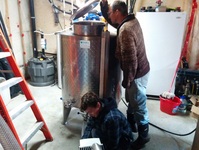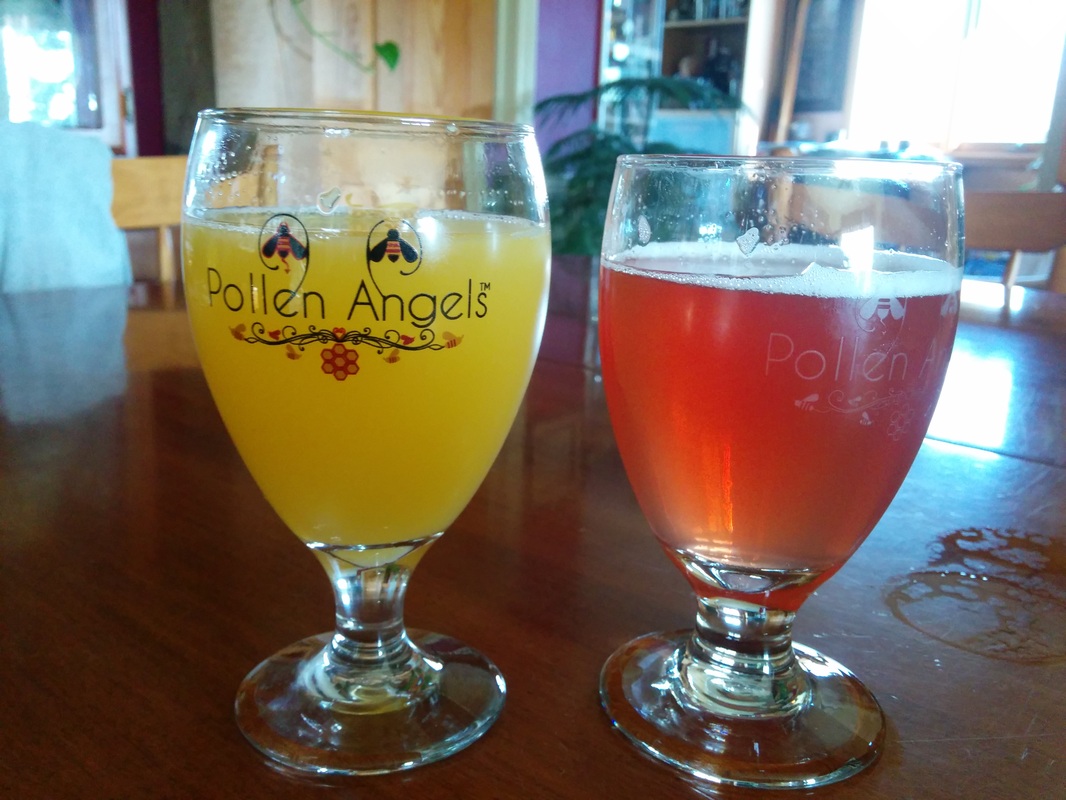|
This morning I had the opportunity to meet with John. He and his wife have built Sunset Heights Meadery in Fredericton's north-side. Now I don't usually attend tastings before 10am, but I made an exception today. With a drink like a Mead-mosa on the menu, how could I resist?  John is a talker and once he gets started telling me about the bees, honey, biology and chemistry, it's hard to ignore his enthusiasm. In John's own words, "There aren't many products (we're talking about wine, beer, cider, mead, etc.) where increasing what you pay the farmer affects the health of the whole". I ask John about Colony Collapse Disorder. Unless you've been living under a rock, you've heard that honeybees are struggling. John tells me this problem is caused by a mite that lives on the bees, but spends a good portion of its life-cycle feeding off the bee larvae in the hive. If you can kill the mites before putting the bees to bed for winter, then you can prevent the disease, however, treatment requires stopping honey collection earlier. John tells me that by offering a higher price for raw honey, apiarists can treat their bees earlier thereby protecting the health of the whole colony. Back to the mead. What is it anyway? Classic mead is made from three ingredients - honey, water, and yeast. Its fermentation and production cycle is halfway between wine and beer, taking anywhere from 1-3 months. But unlike wine or beer, in addition to monitoring temperature and specific gravity, in the first two weeks additional care is given to "feeding" the yeast. Believe it or not, honey actually doesn't contain the types of nutrients and enzymes that yeast wants to consume, and so aerating and feeding the yeast is very important to keep everything fermenting right along.  To complicate the process even further Mead has many sub-categories: Acerglyn (made with maple), Bochet (carmelized honey), Braggot (with hops), Cyser (with apples), melomel (honey and fruit), methegin (with spices like ginger, orange peel, tea, cinnamon, cloves), oxymel (with wine vinegar), rhodomel (with roses) and frankenmel (doesn't fit into a category) - Just to name A FEW (source: American Mead Makers Association). Sunset Heights Meadery has started distribution. Starting today, you should be able to find their Pollen Angels line-up available on tap at Isaac's Way in Fredericton. John hopes to expand distribution to both Moncton and Saint John in the near future and will have their Mead available in 375mL bottles at liquor stores as soon as possible. Sunset Heights Meadery has 50 bee hives allowing them to be classified as a cottage winery. This classification affords special consideration allowing Sunset Heights to sell their products at Farmer's Markets across the province when production is ready. If you want to know more about Sunset Heights or the Pollen Angels line up, check out their website and facebook pages. Sunset Heights Meadery Facebook:Sunset Heights Pollen Angels Facebook:Pollen Angels
3 Comments
Adam
10/21/2014 10:12:35 pm
I will admit that mead has become one of my favourite drinks, having been recently introduced to it. I am genuinely looking forward to trying Sunset Height's Gold and Silver medal winning meads!
Reply
penny
3/17/2015 10:40:40 pm
Can you call me please regarding a possible presentation to seniors.
Reply
Gilliane
3/17/2015 11:19:07 pm
Hi Penny, I'd be happy to give you a call. Please send me an email with your phone number [email protected]
Reply
Leave a Reply. |
At Uncorked Tours we're all about sharing the fabulous food, wine, beer & spirits being produced in the Province of New Brunswick.
It is our pleasure to share some of the awesome experiences you can have while living or visiting the province. Archives
September 2022
|

 RSS Feed
RSS Feed